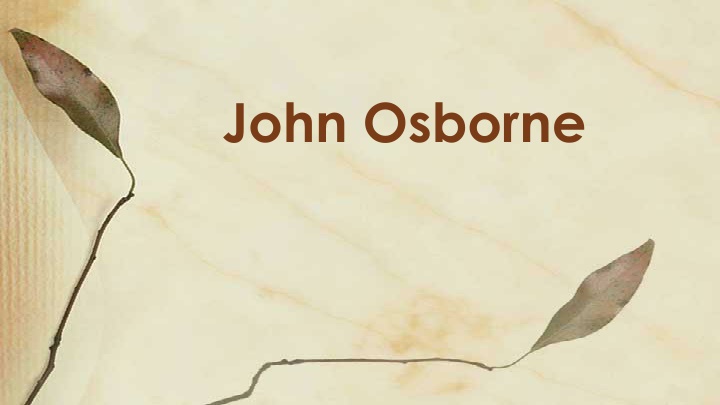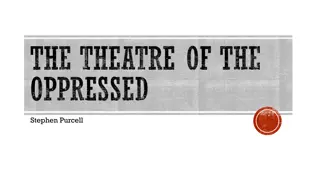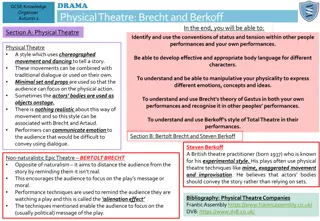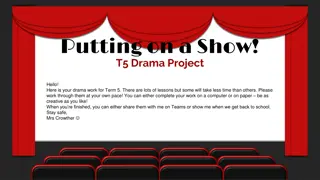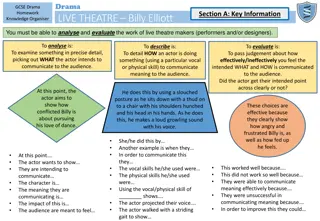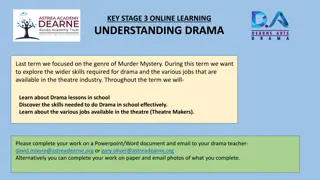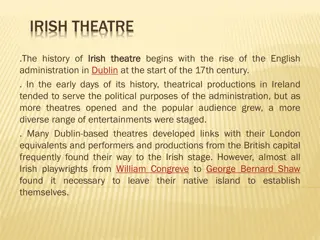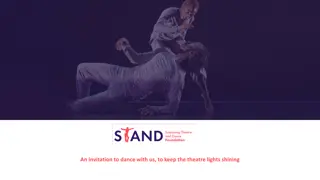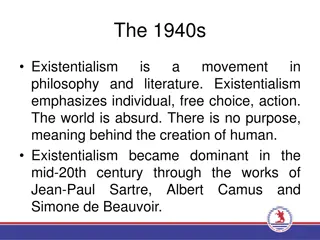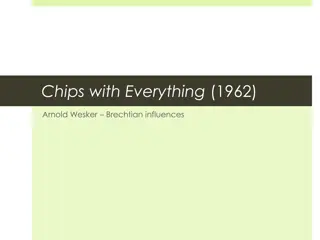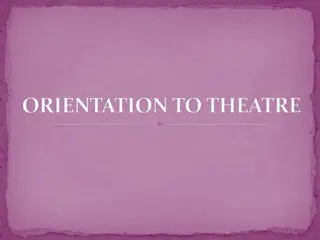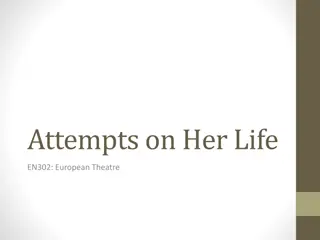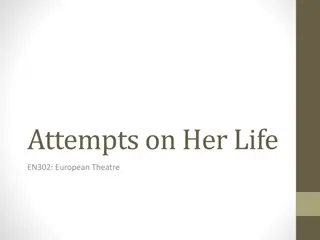The Dramatic Life and Works of John Osborne: A Legacy in British Theatre
John Osborne, a key figure in British theatre, revolutionized drama with works like "Look Back in Anger." He challenged societal norms and redefined contemporary life through his plays, leaving a lasting impact on the world of theater.
Download Presentation

Please find below an Image/Link to download the presentation.
The content on the website is provided AS IS for your information and personal use only. It may not be sold, licensed, or shared on other websites without obtaining consent from the author.If you encounter any issues during the download, it is possible that the publisher has removed the file from their server.
You are allowed to download the files provided on this website for personal or commercial use, subject to the condition that they are used lawfully. All files are the property of their respective owners.
The content on the website is provided AS IS for your information and personal use only. It may not be sold, licensed, or shared on other websites without obtaining consent from the author.
E N D
Presentation Transcript
Osborne from his father s death in 1941 for a boarding- school Belmont College, Devon. He hated it and left after striking the headmaster. He tried trade journalism until a job tutoring a touring juvenile actors introduced him to the theatre. His first play, The Devil Inside Him, was written in 1950 with his friend and mentor Stella actress and one of Osborne s first passions. used insurance money education at company of Linden, an
Osborne made his first appearance as a London actor in 1956, the same year that Look Back produced by the Company. Although the form of the play was not revolutionary, its unexpected. On stage for the first time were the 20- to 30-year-olds of Great Britain who had not participated in World War II and found its aftermath shabby and lacking in promise. Osborne s next play, The Entertainer, projects a vision of a contemporary Britain diminished from its days of self- confidence. in Anger English was Stage content was
In 1958 Osborne and director Tony Richardson founded Woodfall Film Productions. Luther (1961), an epic play about the Reformation showed Osborne s create an actably central figure. His two Plays for England (1962) include The Bambergs, a satire on royalty, and Under Plain Cover, a study of an incestuous couple playing games of dominance and submission. leader, again ability rebellious to Blood of the
Osbornes last play, Djvu (1992), a sequel to Look Back in Anger, revisits Jimmy Porter after a 35-year interval. Osborne reoriented British drama from well-made plays depicting upper-class life to vigorously realistic drama of contemporary life.
LOOK BACK IN ANGER
Themes The Angry Young Man Jimmy Porter is often considered to be literature's seminal example of the angry young man. According to cultural critics, these young men were not a part of any organized movement but were, instead, individuals angry at a post- Victorian Britain that refused to acknowledge their social and class alienation. The Rise and Fall of the British Empire The character of Colonel Redfern, Alison's father, represents the decline of and nostalgia for the British Empire. The Edwardian age which corresponded to Britain's height of power, had been the happiest of his life. His nostalgia is representative of the denial that Osborne sees in the psyche of the British people.
Loss of Childhood A theme that impacts the characters of Jimmy and Alison Porter is the idea of a lost childhood. Osborne uses specific examples -- the death of Jimmy's father when Jimmy was only ten, and how he was forced to watch the physical and mental demise of the man -- to demonstrate the way in which Jimmy is forced to deal with suffering from an early age. Alison's loss of childhood is best seen in the way that she was forced to grow up too fast by marrying Jimmy. Her youth is wasted in the anger and abuse that her husband levels upon her. The Kitchen Sink Drama Kitchen Sink drama is a term used to denote plays that rely on realism to explore domestic social relations. This genre attempted to capture the lives of the British upper class in a way that realistically reflected the ordinary drama of ruling class British society.
Plot Look Back in Anger begins in the attic flat apartment of Jimmy Porter and Alison Porter. The setting is mid-1950's small town England. Jimmy and Alison share their apartment with Cliff Lewis, a young working class man who is best friends with Jimmy. Cliff and Jimmy both come from a working class background, though Jimmy has had more education than Cliff. They are in business together running a sweet-stall. Alison comes from a more prominent family and it is clear from the beginning that Jimmy resents this fact. The first act opens on a Sunday in April. Jimmy and Cliff are reading the Sunday papers while Alison is ironing in a corner of the room. Jimmy is a hot tempered young man and he begins to try and provoke both Cliff and Alison. He is antagonistic towards Cliff's working class background and makes fun of him for his low intelligence. Cliff is good natured and takes the antagonism. Jimmy attempts to provoke his wife, Alison, by making fun of her family and her well- heeled life before she married him. Jimmy also seems to display a nostalgia for England's powerful past. He notes that the world has entered a "dreary" American age, a fact he begrudgingly accepts. Alison tires of Jimmy's rants and begs for peace. This makes Jimmy more fevered in his insults. Cliff attempts to keep peace between the two and this leads to a playful scuffle between the two. Their wrestling ends up running into Alison, causing her to fall down. Jimmy is sorry for the incident, but Alison makes him leave the room
After Jimmy leaves, Alison confides to Cliff that she is pregnant with Jimmy's child, though she has not yet told Jimmy. Cliff advises her to tell him, but when Cliff goes out and Jimmy re-enters the room, the two instead fall into an intimate game. Jimmy impersonates a stuffed bear and Alison impersonates a toy squirrel. Cliff returns to tell Alison that her old friend, Helena Charles, has called her on the phone. Alison leaves to take the call and returns with the news that Helena is coming to stay for a visit. Jimmy does not like Helena and goes into a rage in which he wishes that Alison would suffer in order to know what it means to be a real person. He curses her and wishes that she could have a child only to watch it die. Two weeks later, Helena has arrived and Alison discusses her relationship with Jimmy. She tells of how they met and how, in their younger days, they used to crash parties with their friend Hugh Tanner. Jimmy maintains an affection for Hugh's mother, though his relationship with Hugh was strained when Hugh left to travel the world and Jimmy stayed to be with Alison. Jimmy seems to regret that he could not leave, but he is also angry at Hugh for abandoning his mother. Helena inquires about Alison's affectionate relationship with Cliff and Alison tells her that they are strictly friends. Cliff and Jimmy return to the flat and Helena tells them that she and Alison are leaving for church. Jimmy goes into an anti-religious rant and ends up insulting Alison's family once again. Helena becomes angry and Jimmy dares her to slap him on the face, warning her that he will slap her back. He tells her of how he watched his father die as a young man. His father had been injured fighting in the Spanish Civil War and had returned to England only to die shortly after. Alison and Helena begin to leave for church and Jimmy feels betrayed by his wife.
A phone call comes in for Jimmy and he leaves the room. Helena tells Alison that she has called Alison's father to come get her and take her away from this abusive home. Alison relents and says that she will go when her father picks her up the next day. When Jimmy returns, he tells Alison that Mrs. Tanner, Hugh's mother, has become sick and is going to die. Jimmy decides to visit her and he demands that Alison make a choice of whether to go with Helena or with him. Alison picks up her things and leaves for church and Jimmy collapses on the bed, heartbroken by his wife's decision. The next evening Alison is packing and talking with her father, Colonel Redfern. The Colonel is a soft spoken man who realizes that he does not quite understand the love that exists between Jimmy and Alison. He admits that the actions of him and his wife are partly to blame for their split. The Colonel was an officer in the British military and served in India and he is nostalgic for his time there. He considers his service to be some of the best years of his life. Alison observes that her father is hurt because the present is not the past and that Jimmy is hurt because he feels the present is only the past. Alison begins to pack her toy squirrel, but then she decides not to do so. Helena and Cliff soon enter the scene. Alison leaves a letter for Jimmy explaining why she has left and she gives it to Cliff. After Alison leaves, Cliff becomes angry and gives the letter to Helena, blaming her for the situation. Jimmy returns, bewildered that he was almost hit by Colonel Redfern's car and that Cliff pretended not to see him when he was walking by on the street. He reads Alison's letter and becomes very angry. Helena tells him that Alison is pregnant, but Jimmy tells her that he does not care. He insults Helena and she slaps him, then passionately kisses him.
Several months pass and the third act opens with Jimmy and Cliff once again reading the Sunday papers while Helena stands in the corner ironing. Jimmy and Cliff still engage in their angry banter and Helena's religious tendencies have taken the brunt of Jimmy's punishment. Jimmy and Cliff perform scenes from musicals and comedy shows but when Helena leaves, Cliff notes that things do not feel the same with her here. Cliff then tells Jimmy that he wants to move out of the apartment. Jimmy takes the news calmly and tells him that he has been a loyal friend and is worth more than any woman. When Helena returns, the three plan to go out. Alison suddenly enters. Alison and Helena talk while Jimmy leaves the room. He begins to loudly play his trumpet. Alison has lost her baby and looks sick. Helena tells Alison that she should be angry with her for what she has done, but Alison is only grieved by the loss of her baby. Helena is driven to distraction by Jimmy's trumpet playing and demands that he come into the room. When he comes back in, he laments the fact that Alison has lost the baby but shrugs it off. Helena then tells Jimmy and Alison that her sense of morality -- right and wrong -- has not diminished and that she knows she must leave. Alison attempts to persuade her to stay, telling her that Jimmy will be alone if she leaves. When Helena leaves, Jimmy attempts to once again become angry but Alison tells him that she has now gone through the emotional and physical suffering that he has always wanted her to feel. He realizes that she has suffered greatly, has become like him, and becomes softer and more tender towards her. The play ends with Jimmy and Alison embracing, once again playing their game of bear and squirrel.
Themes Attention Many people in the play want the attention and respect of others, but the more they do to command it, the less of it they receive. Pride The play is set during the Suez Canal crisis, which is indicative of an overall loss of international power for Great Britain. The decline in British fortune parallels the decline in the music-hall business that supports Archie Rice, his wife, and sons. Indeed, the music-hall no longer provides enough revenue to feed and house the family, so Billy Rice has been contributing money for a long time to keep the family in their very limited and unsatisfactory dwelling.
Feeling Alive One of the reasons old Billy is so upbeat and optimistic despite his age is because he has had a chance to reach the top of his profession. Unlike his son Archie, Billy believes he truly got to live and to feel alive. Class Billy does not give the impression of belonging to any particular social class, but he sent both of his sons to an extremely expensive school where they mingled extensively with young men of a higher social class. In the case of Bill, the elder son, the expensive education paid off and set Bill on the path to becoming a successful barrister. Archie, who received the same education, retains some of the trappings of a higher class such as an educated vocabulary and a slight tendency to be pedantic, however he surrounds himself with people of a noticeably lower class than himself.
Plot Scene 1 The scene opens with a tasteless variety show and a suggestion of domestic violence offstage, setting the location as a fairly low-class boarding house of some kind. An old man, Billy Rice, is trying to break up an argument between an offstage couple in a different apartment. Billy has a strong voice and comes across as a more upper-class gentleman. Jean Rice, initially described as Girl , arrives and is welcomed in by her grandfather Billy, who indicates that some landlady has let out Mick s old room to another person. This too helps to set the scene: the family does not own the building and is renting a group of rooms in a house, but does not rent the entire house. So despite Billy s higher-class mannerisms the group is not wealthy. While discussing where to go and what to do, Billy s remarks suggest that he is an aging singer or performer of some kind. But Jean asks after Dad , who is at the theatre. Billy indicates that he advised Jean s father to get out of the stage show business, and that he wouldn t listen. Billy wants to pay Jean s train fare, and talks about having a small amount of money set aside in the Post Office , possibly in cash, however Jean feels guilty about borrowing money from him. Billy establishes himself as somewhat old-fashioned. He dislikes television in pubs, women who show too much skin, and women who drink too much in public. Jean has had four gin drinks on the train. However he pities the young people, because he s known good things in his life even though his best years are behind him.
Scene 2 - 3 The scene opens with Archie Rice s comedy sketch and song from his variety show. He interacts with an off-stage witty person from the audience.He is Jean s father at his theater. Phoebe has made an appearance. She s about sixty, with poor makeup and common mannerisms, but she dotes on Jean and starts sampling the gin Jean brought as a gift. She drinks heavily, but Billy abstains. Jean indicates that she and Graham (her boyfriend) have had an argument. Phoebe acknowledges that although Jean is not her own she still cares about her because she s Archie s daughter. This finally establishes the four characters relationships to each other, and it places Archie squarely in the middle as Billy s son, Jean s father, and Phoebe s love interest. Jean s description of the argument between herself and Graham shows a significant class difference between them. Whereas Jean is an educator of young people from a Youth Club for disadvantaged children, Graham is an aspiring lawyer who disapproves of Jean s nascent interest in politics and her presence at an anti-government rally at Trafalgar Square. Jean hates her job and finds it difficult, but she believes she s getting somewhere with the teenagers. Graham wants to marry her, but Jean wants to try different things first. She doesn t know exactly who she is or what she wants out of life, but she feels stifled and controlled by Graham. Mick, who was mentioned in the first scene, is described more fully. He s one of Phoebe s sons, who is serving overseas in the military. Frank, her other son, refused to serve and was imprisoned six months for it. Now Frank plays the piano and is a porter and boiler-stoker in a hospital. This earns him some income. Billy mentiones the Dardanelles, in World War I, which he survived without a scratch.
Scene 4-5 Archie is performing again and some of his jokes are falling flat. Yet he blusters a bit, presenting himself as a bit of a rake and a ladies man, and closes with a song again that is somewhat patriotic but mostly about looking out for number one. Archie finally arrives, somewhat drunk, and is welcomed by Billy, Jean, and Phoebe. In one of his many throwaway comments which convey a great deal of plot exposition, he mentions that he is behind on his income taxes. There is a brief discussion about male ballet dancers that is mildly homophobic. Both Billy and Archie make derogatory remarks about foreigners and homosexual men. The variety show is losing what little popularity it had, but Archie puts on a show of bravado and tries to get the other characters to drink in honor of having avoided the tax man for twenty years. He deliberately insults and baits his elderly father. A telegram has arrived for him, but he ignores it. Phoebe is tired of hard work and poverty, but Jean detects that something is wrong. After the others have gone to bed, Jean coaxes Archie into telling her the truth: Archie and Phoebe s son Mick has been captured in the Suez.
Scene 6-7 Some time has passed. Billy, Phoebe, and Jean are talking about the fact that Mick is famous and the papers say he will soon be returned home. Billy reminisces about the past when he was a guest of an Ambassador, who gave him a case of expensive cigars. Phoebe has a premonition that the British government s attempt to get Mick back will fail, but Billy is confident that Britain s power and influence will save Mick. Phoebe indicates that Archie s show is a failure and that he s never been able to get the top talent to work with him. She is drunk and garrulous, and stressed over Mick. She tells Jean not to presume too much, given that Jean isn t her daughter whereas Mick and Frank are both her boys. She complains about Brother Bill, Billy s older son and Archie s older brother, who was given the same excellent education as Archie, who became a successful lawyer, and who helped the family from a distance but who never understood them. Archie and the children hate him for it, but Phoebe likes and admires Brother Bill. Archie enters with Frank, his second son. He starts baiting the drunk and defenseless Phoebe, who is emotionally upset over many long-ago events including the fact that it was the despised Brother Bill who paid most of Jean s college expenses. Billy mistakenly helps himself to a slice of a cake Phoebe bought in anticipation of Mick s safe return. Phoebe verbally attacks Billy, who leaves sadly. It is revealed that the family is living chiefly off of Billy's savings and his pension, along with occasional gifts from Brother Bill. Archie is onstage again, dead behind the eyes and trying to pretend to be witty and clever. His comedic patter is falling flat and is mostly incoherent. Compared to his witty and natural act in the second scene, he appears to have lost nearly all of his polish and his professional craft. The audience (what there is of it) is bored. Archie sings a song about being grateful to be normal . There are bursts of attempted patriotism in extremely poor taste but nobody responds.
Scene 8-9 After the night s performance, Archie, Frank, Phoebe, Billy, and Jean are at home trying to distract themselves. Frank delivers a pithy soliloquy about being a nobody and not having a chance to do anything meaningful or important. He tells Jean to start thinking about number one and what s good for herself, because nobody else will. Archie relates a story about when he went to Canada during the war and saw the most moving performance of his life, when an old woman of African descent sang a spiritual in a bar with so much emotion and feeling that Archie realized that nothing he d ever accomplish as a showman would be nearly as good or as authentic. He wishes that he and that old woman could trade places so he could experience that amount of emotion, because deep down he s given up and simply doesn t care anymore. Later, when Jean explains that Phoebe suddenly turned on her, Archie explains that Phoebe caught him in bed with Jean s mother, and that Jean s mother left him and died not long afterwards. A policeman arrives with bad news. Mick has been killed by his captors. Archie finally experiences a loss powerful enough to overcome his inner feelings of deadness and sings a spiritual with as much feeling as the old woman back in Canada. There is no audience. Instead of Archie on the stage alone performing for an audience, it s his son Frank. Frank is playing at a piano, and singing alone. He s asking someone to bring his brother s body back on an airplane, but not to talk to him.
Scene 10-13 After Mick s funeral, the family is at home. Jean wants a serious conversation, but Archie is nattering on about his adventures. She becomes frustrated with the way her family is grieving, and they are angry at her for not understanding. She begins to see the schism between them, and how she is becoming more like Graham and Brother Bill in terms of her values and her world-view. Jean wonders what it s all for, and why her brother had to die in some bizarre overseas incident that had nothing to do with the family. She s angry and she wants to object. Archie plans to divorce Phoebe in order to take up with a young twenty-year-old woman whose parents are supposed to be funding Archie s stage production. Billy went to see her parents and told them Archie was married, thereby ending the affair and also Archie s last chance of having a financial backer for his show. Billy therefore feels a need to perform again so as to save his son. Billy is coming out of retirement for one more stage production to save Archie. Archie is giving a farewell announcement for his father Billy, who has died of a heart attack. A woman representing the one whose performance he adminred in Canada enters, symbolically dons Billy s hat and gloves, and dances away with them. She, and not Archie, will carry on Billy s entertainment work. Two conversations are going on: one between Jean and Graham and the other between Archie and Brother Bill. Bill is offering Archie a last chance to start anew in Canada working for a relative of Phoebe s. Phoebe and Frank will be going. Jean is breaking up with Graham permanently because she feels more emotionally attached to her odd, eccentric family than to Graham s way of being. She needs more than that, so she plans to stay with Phoebe until Phoebe and Frank leave for Canada, with or without Archie. Nothing in the text suggests that Jean has been invited to join them: she is, after all, not Phoebe's daughter. Archie s final performance. In a roundabout way, he talks about the need to be sincere, to feel emotions, and to be authentic. He tries to sing his Why Should I Care song, but it peters out. He leaves with Phoebe and the spotlight winks out. Only the music remains.
